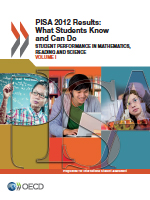December 06, 2013
PISA 2012 results are organized in six volumes; every volume has a chapter ‘What data tell us’ and a chapter ‘What this means for policy and practice’.
What students know and can do: student performance in mathematics, reading and science.
- Excellence through equity: giving every student the chance to succeed.
Ready to learn: stdents’ engagement, drive and self-beliefs.
What makes schools successful? Resources, policies and practices.
Skills for life: student performance in problem solving (forthcoming, in 2014).
Students and money: financial literacy skills for the 21st century (forthcoming, in 2014).
In 2015 the test will focus on science.
Read more about the key findings and at http://www.oecd.org/pisa.
